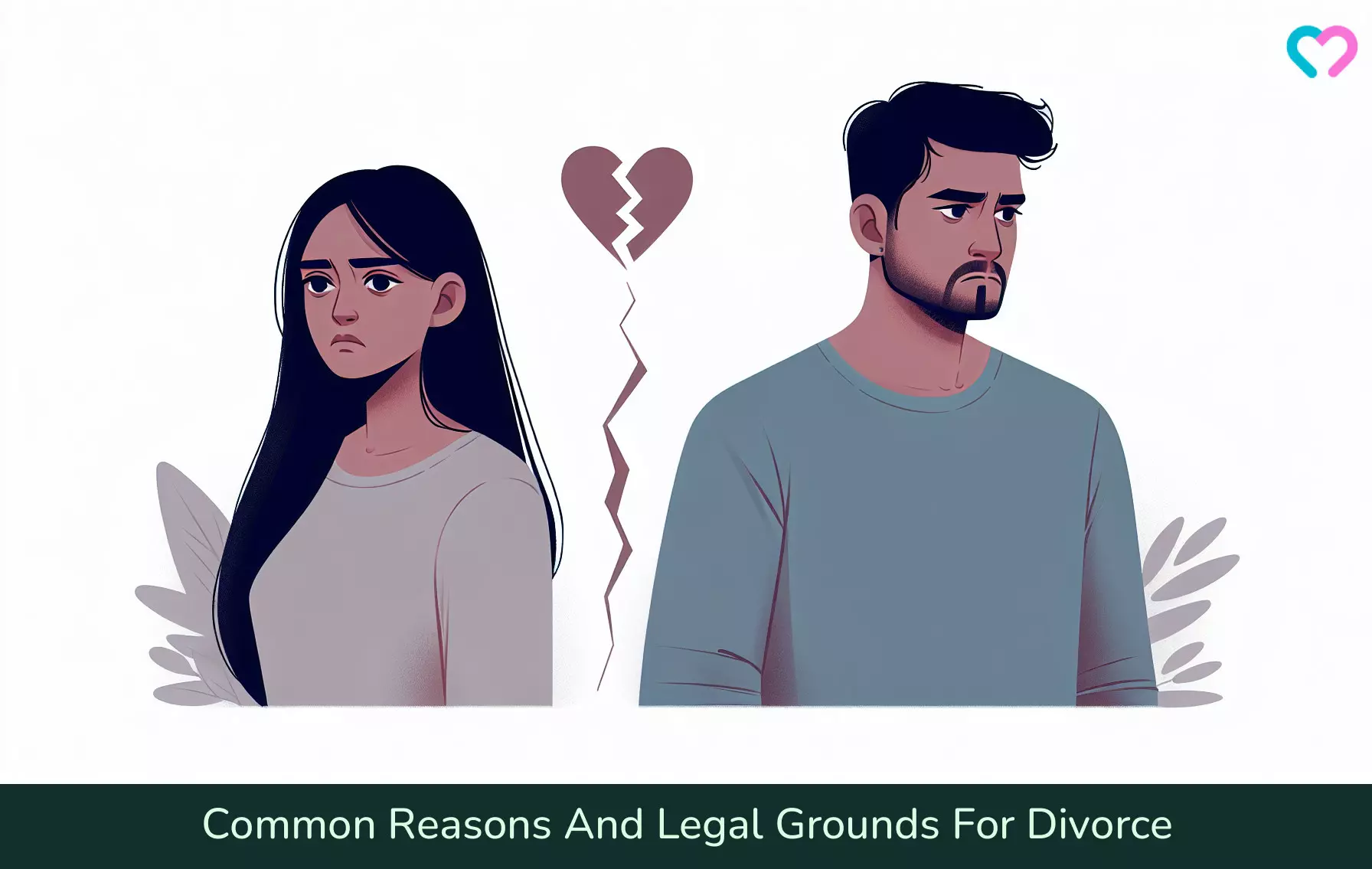
Image: Shutterstock
Divorce is often the result of unmet expectations that lead to emotional and sometimes physical distance between married couples. This causes dissatisfaction and ultimately leads to separation and divorce. There are several reasons for divorce, unique to each couple. Unhappiness in a marriage may not only arise due to arguments, fights, or ideological differences, but also because of indifference, lack of communication, and feeling disconnected and distant from each other. However, it becomes difficult to accept this change as the person they can’t cooperate with was also someone they were once in love with. Couples also face the issues of catering to each other’s high standards and unrealistic expectations, which might burn them out, leaving them drained out emotionally and mentally. So, let’s discuss the multiple reasons for divorce and the legal grounds on which it can be granted. Read on to learn more.
Key Pointers
- Infidelity, abuse, and lack of communication can harm relationships emotionally.
- Financial burdens and added responsibilities can cause stress in relationships.
- Long-distance relationships, loss of physical intimacy, personal insecurities, and lack of love can cause a rift between partners.
- Marrying early, having less education, living together or becoming parents before marriage, and having divorced parents can increase the likelihood of divorce.
21 Most Common Reasons For Divorce
Statistical bulletin Divorces in England and Wales 2011 says: “The probability of getting divorced by the next wedding anniversary rises rapidly in the first five years of marriage so that between the four and eighth wedding anniversaries the probability of getting divorced by the next anniversary is over 3%.
After the eighth wedding anniversary, the probability of divorcing decreases from this peak, and by the 26th anniversary, the chance of divorcing by the next anniversary is less than 1%.” Here are the most common reasons for divorce:
1. Extramarital affairs
You may have promised your spouse to be loyal to him forever and he may have vowed the same to you. Over the years, these promises could get blurred. You or your husband may have become involved with someone who you thought was giving you attention or affection, something that you expected from your husband.
According to a study (1), 27% of divorces happen due to cheating. Infidelity will leave a long-lasting scar on a person’s psyche, and may make him suspect his future partner as well.
2. Finances

Image: IStock
No matter how much you love each other, you need to be practical and calculate your finances. The initial days may be smooth, but once you burn through your savings, you will realize that this is creating a stress and rift in your relationship. If your husband is unemployed, or you have a mounting debt, you could begin to lose respect for him. Also, you may be so bogged down and worried by money matters that the love between you begins to decline.
Also, if you believe in savings for your future and your husband is a spendthrift, it creates a rift. Usually, this could be a part of midlife crises. So. if you can mend it before it gets complex, you could save your marriage from falling apart.
3. Physical and emotional abuse
This is a serious problem, which makes it necessary for the victim to end the marriage. In fact, 34% of the divorces take place due to verbal, physical, or emotional abuse. Even though the abuser may proclaim this, no one ever deserves to be physically, emotionally or verbally attacked. The scars are visible in physical abuse, but the marks left by verbal and emotional neglect and torture are invisible yet just as traumatizing. In some cases, both spouses are abusive, hurling expletives and hitting each other.
 Quick fact
Quick fact4. Lack of communication
You tend to get so busy with children and careers that the one that should be the most important person in your life gradually becomes the least important. You hardly make time to talk to each other anymore. When was the last time you told him that you love him? You may take the other for granted until the bond between you diminishes and reaches a point of no return.
Such situations might lead to lack of commitment, which could result in many issues in a marriage. If a communication gap is the only consideration for divorce, it is better sorted out through professional counseling than through divorce.
5. Not meeting the expectations
If you thought that your husband would be a Greek god forever, you will be disappointed to know that he cannot always be as handsome and debonair as he was when you were dating him.
Also, back then he would have been the perfect guy out of a Hollywood movie, being chivalrous or personifying stability and efficiency. A few months into marriage you could realize that he is unproductive, unorganized or has difficulties in managing his life.
Alternatively, your husband might have wanted you to maintain an hourglass figure, even after having children. Unfortunately, you may have gained so much weight that he feels disappointed or no longer attracted to you.
Changes are inevitable in all marriages and it is important for couples to ride the wave of transition. Minor expectations can be given a go-by if the more important elements are strong, such as love, trust, and understanding.
Sabhyata Mamgain, a writer, reflects on her journey toward divorce, driven by the difficulties in her marriage. She shares, “I was invested in my marital relationship and was focused on nurturing my family to one day realize I was pleasing a blood-sucking parasite. My husband was a shrewd, rude, mean, and miserable man who kept on trying to treat me like a doormat. He wanted me to clean, cook, and earn to support him. He was so focused on his finances that he soon forgot that he had married a woman, not a robot following orders.
“After being hurt by my partner for two years, I sent him a warning, and even after that, nothing changed. Finally, I realized I had to set myself free from the toxicity in my life by filing for a separation (i).”
6. Addictions
One of the most serious causes for divorce is alcohol, drug, or substance abuse, which can upset and batter a family unit beyond repair. It takes a huge toll on your relationships, career, finances, and children’s emotional wellbeing. It is not uncommon for the addictive spouse to lie to his loved ones, steal money, and become abusive at home, which can be quite unsettling and even dangerous for the entire family.
7. Parenting styles

Image: IStock
Let’s say that you are a strict disciplinarian who cannot tolerate misbehavior from children and your husband is fine with relaxing or breaking rules now and again. Or, maybe you’re less strict parent. Children often favor the less strict parent because they are unable to recognize discipline as being loving, caring and setting them on the right path.
If you are not united with your partner in how to discipline the children, arguments and disillusionment could grow to the extent of separation and breaking up the family.
8. Incompatibility
Your dreams and aspirations are different from his. For example, you may believe in working hard and creating wealth so that you can both enjoy your later years. He, on the other hand, may want to take life as it comes and live by each moment. You might think of him as too casual whereas he might see you as taking life too seriously. This incompatibility can lead to disputes and discontentment within the relationship.
9. When love is not the foundation
If either partner has entered into the relationship, not for love but for wealth, then the marriage will end once you meet the materialistic goal. If the decision to marry was made due to looks, charm or sex-appeal, then the foundation is not strong enough to stand the test of time.
10. Insincerity and dishonesty
If the love in your marriage has slowly disappeared, insincerity tends to creep in. Perhaps you are staying together because of the children, finances or social status that your marriage bestows upon you.
Dishonest in a marriage is also bound to develop cracks in the bond, which will eventually break up the relationship. Imagine sharing all your financial details, such as bank accounts and passwords, only to be betrayed . This could be devastating not just financially but also emotionally.
11. Losing your identity

Image: IStock
You are a wife, a mother, a daughter-in-law, taking care of them and their needs, but what about you ? A decade after marriage, when you look back and see the traces of yourself getting completely erased, you realize what you have lost is your sense of self. It gets worse when your husband and family do not recognize the sacrifices you have made along the way.
This need not lead to a divorce. Talk to your spouse, explain to him how you don’t feel validated or valued, and that you have lost yourself within this relationship. He will understand if he values your contribution to his life.
12. Immersed in responsibilities
Children are of utmost importance to you. Anything or anyone is second to your kids. They demand every minute of your time throughout their lives as babies, children and adolescents. Healthy children require a mother’s love and devotion to their physical, emotional and educational needs. The teenage years are the most delicate phase as they need all of your support.
If you are a working mom, then balancing the responsibilities of your job and children will leave you with no time for your spouse. Your regular weekend dates or candle-lit dinners that you had in the early days seem to have happened in a bygone era.
You can always make efforts to bridge that gap between your husband and yourself by keeping love and affection alive in your relationship.
13. Lack of physical intimacy

Image: IStock
How many times in a week do you have sex with your husband? When was the last time you had some intimate moments with him? Apart from sex, there are also other forms of physical affections such as kissing or hugging that you can provide within your daily life.
Lack of intimacy could gradually lead to a huge gap in your marriage, filled with anger, silence or distancing. To avoid this, take action before it’s too late.
14. A point of no return
Conflicts are common in a relationship. Constructive communication is required for a healthy marriage. But what if the disagreements happen very often and over frivolous issues? It spreads so much unpleasantness in your lives that your relationship bond becomes irretrievable, becoming one of the signs that your marriage is over.
15. Long distance relationship
Long-term physical distance can lead to misunderstandings, suspicion, communication problems, and mental health issues. For example, you may suspect him of being somehow disloyal he doesn’t pick up your call, or respond to your messages. Initially, you may be an understanding wife, and he would accept your unresponsiveness. However, if healthy communication practices are not in place, the relationship may not be able to bear all this stress for much longer.
16. Thirst for control
If you want to dictate terms to him or if he wants to control everything in your life, then there will only be unpleasantness in your lives. The more intrusive you become, the more stubborn he gets.
17. Connection with your ex
Being in touch with your ex-boyfriend or husband is fine. But if it goes beyond a simple hello and he intrudes into your life too often, it can build up tension in the relationship with your husband. This can be a major reason why both of you may find yourselves growing apart over time.
18. Children from previous marriage
Blended families certainly have their challenges and the stress it causes can often lead to divorce. It looked all fine before marriage as you both thought it wasn’t difficult to live under the same roof with his kids and your kids from previous marriages. But reality certainly sets in after you all begin living together.
19. Interference of parents
In-laws and parents, although well-intended, may create a problem in your marriage. They want to share their advice and to give guidance, whether you have asked for it or not. They stay with you and interfere in every conversation that takes place between you and your partner. It is annoying to have somebody poking their nose in your affairs. You desire their counsel as they are more experienced than you, but at the same time they cannot fill up every moment of your married life with their presence.
20. Jealousy and insecurity
A pretty young girl winked at your husband in the previous night’s party and you could not sleep after coming home. Maybe he has stopped kissing you before going to work and messaging you after he reaches office. He never seems to receive your phone calls and does not bother to explain whyl. He keeps his phone locked with a password, secretly reads his messages and giggles at them. Valid enough reasons to get insecure If you don’t speak up, things will build up heading you towards a divorce. Don’t let another day go by without talking it out and making an attempt to find out more. You may still have a chance to save your marriage.
21. Cultural backgrounds
Cultural differences could be a bone of contention for newly married couples. When you are in love you do not have to bother about your lover’s traditions and practices, but once you become a family, you are expected to accept them. The matters can worsen if you two are from different religions and are tightly bound to your respective practices.
Risk Factors For Divorce
Any marriage can result in a divorce if there is a lack of trust and no rapport, understanding, and love between the couple. However, certain marriages carry a higher risk. According to a report (2), here are those riskier marriages:
1. Young age
Early marriages, usually teen marriages, are more likely to end in divorce especially in the initial years. The risk lowers once the couples reach their 20s as they tend to become more mature.
 Research finds
Research finds2. Education
Couples who are less educated have higher chances of getting divorced. For instance, those with college education are better placed than those who ended their education at higher secondary level.
3. Low income
According to research, people with annual income of less than $50,000 are more likely to seek a divorce than those with incomes higher than that. Needless to say, finances or lack of them creates a rift between the couple.
4. Living together before marriage
Living together before marriage may deprive you of all the excitement of getting married and being with your spouse. There is no difference in the life before and after marriage, and there is nothing new. You cannot understand the importance of marriage or understand the need for commitment.
The risk of separation is even higher for individuals who have lived with multiple partners.
5. Parenthood before marriage
Imagine having a child even before you have decided to marry. You live with your partner, bear a child, and have to marry only to make that birth a legitimate one. How long can you manage in such an arrangement, just for the baby’s sake? Such parents separate by the time the child goes to school.
In the US, 37% children are born out of wedlock.
6. No religious beliefs
Every religion puts certain restrictions on our behavior and moral conduct. For people who do not follow any religion, those constraints are less likely to be there.
7. Parents’ divorce
If your parents are divorced, and you are not brought up in an ideal familial environment, you may not understand the importance of relationships. Divorced parents double your risk of divorce. And if your spouse, too, has separated parents, then your chances of divorce triples.
8. Excessive use of social media
In today’s digital age, social media plays a huge role in maintaining or breaking marriages by creating unrealistic comparisons that can lead to jealousy and dissatisfaction. Couples who engage excessively on social media may also not find time to bond with each other.
These could be some of the leading causes for divorce. But that does not mean that you are bound to fail in your marriage. You may have to work harder than others to make your relationship work. And if your feelings for each other are strong, no factor can be a risk for you.
Legal Grounds For Divorce

Image: IStock
You do not get a divorce just because you are no more willing to live with your spouse. The court seeks you to prove that you have irreconcilable differences in your marriage (3).
Each country has its own laws on divorce. Within the US, the laws differ among the states. However, certain reasons are recognized by most countries as valid grounds for divorce.
In North America, the legal grounds are segregated into ‘For-fault’ and ‘No-fault’. As the names suggest, ‘No fault’ or ‘Uncontested’ is where none of the two has wronged and the separation is mutual while ‘For fault’ is a situation where the wife or husband has done something damaging to the other.
Here are the common grounds on which you can file for a divorce:
No-fault:
1. Irretrievable breakdown
This is a no-fault reason, wherein both the husband and wife agree to separate legally. You can get a divorce once the custody of your children, division of properties, child support, etc., are settled or mutually decided. This process is usually done without assigning blame, which makes no-fault divorces less contentious.
 Quick fact
Quick fact2. Separation for one year
If you are living separately from your spouse for one year, it is a valid reason for divorce with mutual consent. Living separately need not always mean living at a different place. You both can live under the same shelter yet not live like a couple. However, the latter case is difficult to prove in the court.
In England, the minimum period of separation is two years.
For-fault
3. Separation for two years
Separation from your spouse for two years or more is a reason enough to get divorce, even if your partner does not consent to it. In England, this period is five years.
4. Desertion or imprisonment
If your spouse has abandoned you or you have sent him out for more than one year, then desertion is a ground for divorce. It is two years in England. If your spouse has been imprisoned for three years or more, then it is acceptable grounds for divorce.
5. Cruelty
You can cite an abusive relationship for seeking divorce. You can petition that your spouse has been cruel, abusive and violent, and inflicting inhuman treatment (including forceful sex). However, the court may seek evidence on this, as the divorce would be a contested one.
6. Adultery
In case your husband is having an extra-marital relationship, you can get divorced. However, this will not work out if you knew about his adultery but continued to have a relationship with him, you have encouraged him into doing it, or you have cheated on him. However, adultery can be a ground for divorce.
In England, same-gender sex is not considered adultery. This holds good even if yours is a same-sex marriage (4).
Adultery is something difficult to prove as you need a witness to testify and your testimony is not accepted.
7. Health conditions
In a few countries, health conditions such as impotency and insanity, which have not been revealed at the time of marriage, are considered a accepted and reasonable ground for divorce.
Biblical Reasons For Divorce
There are scriptural grounds for divorce. Religious scriptures help believers to live in harmony. They do not encourage the breakdown of families. The Bible asks its followers to confess any wrong-doings, forgive the wrong-doers, and try to restore the relationship through counseling.
However, the New Testament recognizes two grounds for divorce: adultery and desertion (5).
Divorce is a difficult phase in life, and drains you and your spouse physically, emotionally and sometimes financially as well. This needs to be the last resort to restore peace in your life. If you have children, they become an important part of your decision of getting legally separated.
Taking professional advice will help you wade through these difficult times.
Frequently Asked Questions
1. How many or what percentage of marriages end in divorce?
In the US, nearly 42% of marriages that happened between ages 15 and 46, ended by the time women turned 46 years (6). Statistics in the UK show that 42% of marriages in England and Wales end in divorce (7).
As per the data collected by Wikipedia, (8) Belgium has the highest rate of divorce at 71%, Portugal 68% and Hungary 67%. Several other European countries have a higher divorce rate than the US. Chile has the lowest at 3%.
2. What is the most common or the number one reason for divorce?
According to a study by Harvard University, the biggest reason for divorce is the husband’s employment status. Therefore, men who do not have a full-time job are more likely to get divorced than those with full-time employment.
Accountancy firm Grant Thornton has found that the primary reason for divorce in the UK is falling out of love with the spouse.
Research done by Austin Institute says that the most common reason for women to divorce is emotional abuse (37%), while for men (more than 30%) it is getting ‘tired making a poor match work’ (8).
3. Who suffers most in divorce?
Divorce can be an emotionally taxing experience for everyone involved, including partners, children, and extended family members. Research suggests that children often suffer the most in a divorce, as it can lead to changes in their living arrangements, relationships with parents, and overall stability (9). They may also experience feelings of loss, insecurity, and anxiety.
4. How many people are happier after divorce?
It is difficult to quantify the number of people who are happier after divorce, as each individual’s experience is unique and can be influenced by various factors.
Divorce in a marriage is unfortunate; however, if couples cannot stay in a happy relationship, they may choose to separate rather than remain unhappy. The reasons for divorce can be unique to every couple. While some may separate due to financial issues or lack of communication, others may do it because of clashes in parenting styles, the burden of responsibilities, and cultural or religious differences. Furthermore, young age, less education, and lack of religious beliefs may also lead to differences in relationships. Whatever the reason, the court is the final decision-maker in granting a divorce to couples. However, before separating from your partner, give your decision good thought.
Infographic: How To Find A Good Divorce Attorney?
Divorce is one of the most difficult stages of a couple’s life. This phase can sometimes take a toll on your physical and emotional health and might drain you financially. However, finding the right counsel could be helpful. Check out this infographic to understand the most important factors you may consider while hiring an attorney.

Illustration: Momjunction Design Team
Illustration: Common Reasons And Legal Grounds For Divorce

Image: Dall·E/MomJunction Design Team
Divorce is a heartbreaking reality for many couples. Learn the top 15 reasons why 50% of marriages end in divorce.
Personal Experience: Source
MomJunction articles include first-hand experiences to provide you with better insights through real-life narratives. Here are the sources of personal accounts referenced in this article.
i. The divorced life.https://medium.com/@sabhyata.mamgain/the-divorced-life-a715c69a384b
References
- The Divorce Experience: A Study of Divorce at Midlife and Beyond.
https://assets.aarp.org/rgcenter/general/divorce.pdf - Divorce Courses.
https://extension.usu.edu/divorce/ - Getting a divorce.
https://www.illinoislegalaid.org/legal-information/getting-divorce - Get a divorce.
https://www.gov.uk/divorce - What are biblical grounds for divorce?.
https://www.gotquestions.org/grounds-for-divorce.html - Marriage and divorce: patterns by gender, race, and educational attainment.
https://www.bls.gov/opub/mlr/2013/article/marriage-and-divorce-patterns-by-gender-race-and-educational-attainment.htm - What percentage of marriages end in divorce?.
https://webarchive.nationalarchives.gov.uk/ukgwa/20160106011951/http://www.ons.gov.uk/ons/rel/vsob1/divorces-in-england-and-wales/2011/sty-what-percentage-of-marriages-end-in-divorce.html - RESEARCH ON FAMILY AND CULTURE.
https://www.austin-institute.org/research/divorce-in-america - Is Divorce More Painful When Couples Have Children?
https://read.dukeupress.edu/demography/article/53/6/1717/167649/Is-Divorce-More-Painful-When-Couples-Have-Children - Domestic Violence.
https://www.aamft.org/AAMFT/Consumer_Updates/Domestic_Violence.aspx - Vivian E. Hamilton; (2012); The Age of Marital Capacity: Reconsidering Civil Recognition of Adolescent Marriage.
https://scholarship.law.wm.edu/cgi/viewcontent.cgi?article=2467&context=facpubs - Attacks on No-Fault Divorce Are Dangerous – Especially for Those Experiencing Domestic Violence.
https://www.aclusd.org/en/news/attacks-no-fault-divorce-are-dangerous-especially-those-experiencing-domestic-violence
Community Experiences
Join the conversation and become a part of our nurturing community! Share your stories, experiences, and insights to connect with fellow parents.
Read full bio of Michelle Ahmed
Read full bio of sanjana lagudu
Read full bio of Shikha Thakur
Read full bio of Ratika Pai

















